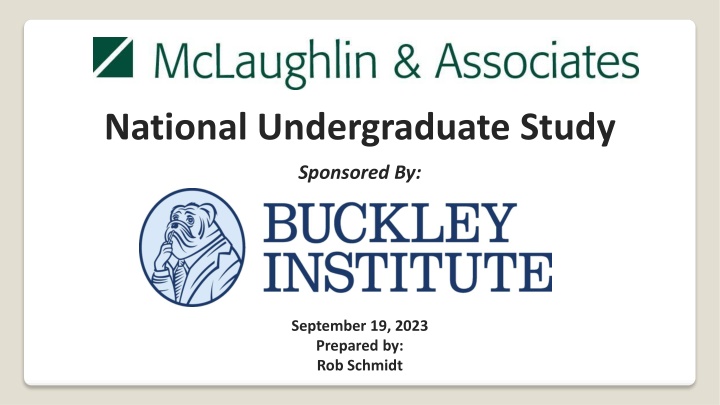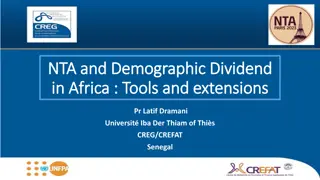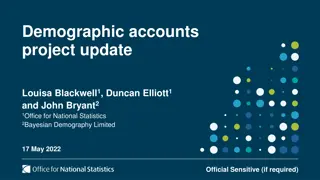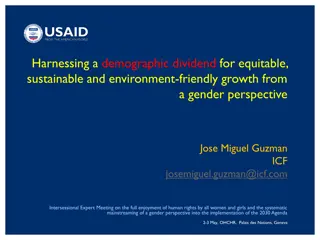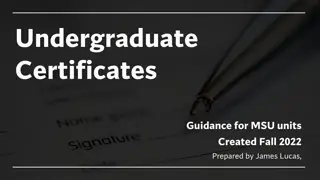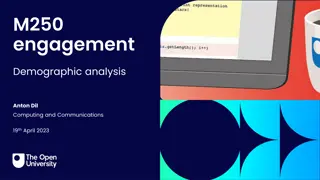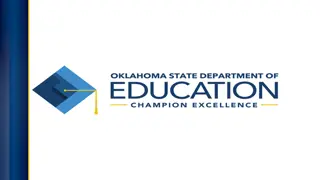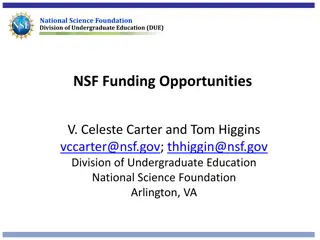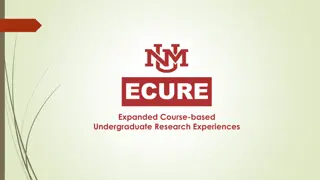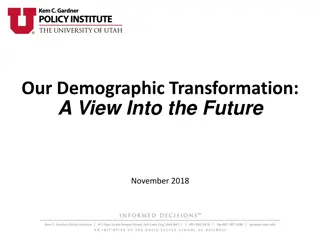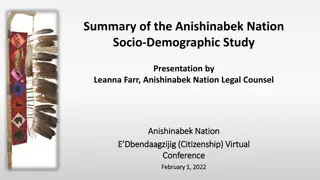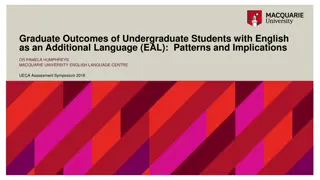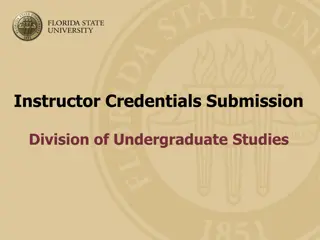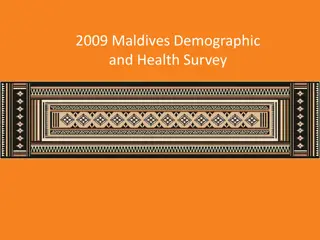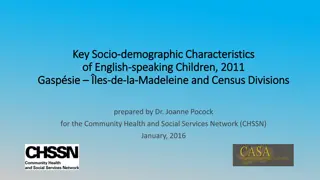National Undergraduate Study - Methodology and Demographic Summary
Conducted by McLaughlin & Associates, this national survey delves into the views and demographics of undergraduate students in the U.S. with a focus on the importance of the Constitution, First Amendment, free speech, and intellectual diversity. The study provides insights into student opinions on key issues and trends among different demographics.
Download Presentation

Please find below an Image/Link to download the presentation.
The content on the website is provided AS IS for your information and personal use only. It may not be sold, licensed, or shared on other websites without obtaining consent from the author.If you encounter any issues during the download, it is possible that the publisher has removed the file from their server.
You are allowed to download the files provided on this website for personal or commercial use, subject to the condition that they are used lawfully. All files are the property of their respective owners.
The content on the website is provided AS IS for your information and personal use only. It may not be sold, licensed, or shared on other websites without obtaining consent from the author.
E N D
Presentation Transcript
National Undergraduate Study Sponsored By: September 19, 2023 Prepared by: Rob Schmidt
Methodology and Demographic Summary School Type Total School Geo. Total McLaughlin & Associates conducted a national survey of 802 undergraduate students from September 9th to 14th, 2023. All student participants were under the age of 25 and attend either a four-year private or public college or university on a full-time basis. This study s universe is the conventional four-year undergraduate, therefore excluding undergraduates who either attend a two-year school, technical school, junior college or trade school, are over the age of 24 or attend on a part-time basis. Private 33% East 18% Public 67% Midwest 21% Class Year Total South 36% Freshman 25% West 25% All interviews were conducted online and respondents were carefully selected and screened from a nationwide representative platform of individuals who elect to participate in online surveys. Data for this survey have been stratified by age, race/ethnicity, gender and geography using the most recent National Center for Education Statistics Report (2021) to reflect the actual demographic composition of four-year, full-time undergraduate students in the United States. According to the NCES Statistics, there are approximately 7,856,529 undergraduates who fall within these parameters. Sophomore 29% Top 5 Majors Total Junior 22% Math/Enginer 25% Senior 24% Business 21% Ethnicity Total Soc./Beh. Sc. 20% White 53% Arts 16% Black 13% Nat l Sciences 13% Because the sample is based on those who initially self-selected for participation rather than a probability sample, no estimates of sampling error can be calculated. However, a confidence interval of 95% was calculated in order to produce an error estimate of +/- 3.5% for the 802 respondents. This error estimate should be taken into consideration in much the same way that analysis of probability polls takes into account the margin of sampling error. The error estimate increases for cross- tabulations. Totals may not add up to exactly 100% due to rounding, refusals and the ability for respondents to give multiple answers to certain questions. All surveys may be subject to multiple sources of error, including, but not limited to question wording and ordering, sampling error, coverage error and measurement error. This study is the ninth iteration of our undergraduate research on behalf of the Buckley Institute at Yale. Hispanic 20% Party ID Total Asian 7% Republican 23% Age Total Democrat 36% 18-19 35% Ind./Other 28% 20-21 40% Not Registered 5% Over 21 25% Ideology Total Gender Total Liberal 44% Male 42% Moderate 31% Nat'l Undergrad Study September 2023 Female 55% Conservative 17% 2 2 Other 3%
Part One The Constitution, First Amendment, Free Speech and Intellectual Diversity Nat'l Undergrad Study September 2023 3
A majority (57%) now say the U.S. Constitution is a very important document for our country compared to 33% who say it is an outdated document. This is the second highest Important response since 2019 and an eight-point rebound from last year. Which of the following comes closer to your own personal opinion regarding the U.S. Constitution? Trend Line 10/19 9/20 9/21 9/22 9/23 Outdated 27% 36% 31% 36% 33% It is an outdated document that is over 200 years old. Amending the Constitution to keep up with today s society is too slow and difficult of a process. OR It is a very important document for our country that serves as the indispensable rulebook for honest government. It still needs to be followed and respected in today s society. Important 63% 52% 55% 49% 57% Outdated Important 80 30 34 30 36 46 28 16 34 34 29 29 30 34 30 26 45 39 31 32 27 61 55 60 53 45 61 81 55 58 62 64 63 54 63 65 46 51 58 57 58 Private School State School 70 Underclassmen (Freshman/Sophomores) 57 Upperclassmen (Juniors/Seniors) 60 Liberal Moderate 50 Conservative 33 40 White Black 30 Hispanic Asian 20 10 Men 10 Women Major Math/Engineering 0 Major Business Outdated Document Important Document UNSURE Major Social/Behavioral Sciences Major Arts Major Natural Sciences Nat'l Undergrad Study September 2023 4 Major Humanities Major Healthcare
The First Amendment continues to be overwhelmingly perceived as an important amendment that still needs to be followed and respected (78%) rather than it being outdated and can no longer be applied in today s society (14%). Trend Line Generally speaking, do you think the First Amendment, which deals with freedom of speech, is ? 9/15 9/16 9/17 10/18 10/19 9/20 9/21 9/22 9/23 17% 10% 12% 17% 12% 20% 13% 12% 14% Outdated An outdated amendment that can no longer be applied in today s society and should be changed OR An important amendment that still needs to be followed and respected in today s society 77% 84% 83% 79% 84% 72% 80% 80% 78% Important Outdated Important 100 16 14 13 16 20 9 10 12 24 16 12 16 12 13 18 16 21 11 11 9 74 80 78 78 74 83 86 80 68 79 77 77 80 80 74 77 72 78 83 86 Private School 90 State School 78 Underclassmen (Freshman/Sophomores) 80 Upperclassmen (Juniors/Seniors) 70 Liberal Moderate 60 Conservative 50 White Black 40 Hispanic 30 Asian 14 20 Men 8 Women 10 Major Math/Engineering 0 Major Business Outdated Amendment Important Amendment UNSURE Major Social/Behavioral Sciences Major Arts Major Natural Sciences Nat'l Undergrad Study September 2023 5 Major Humanities Major Healthcare
A majority (51%) now favors speech codes to regulate speech for students and faculty (38% oppose). This is only the third time more students have favored speech codes than opposed them and the first time an outright majority favored them. Trend Line 9/15 9/17 10/18 10/19 9/20 9/21 9/22 9/23 Would you favor or oppose your college or university having speech codes to regulate speech for students and faculty? 48% 38% 38% 35% 48% 42% 41% 51% Favor 40% 52% 54% 55% 41% 45% 45% 38% Oppose 80 Favor Oppose 54 49 54 46 54 55 43 44 73 57 50 51 50 54 55 48 55 50 52 58 36 39 35 41 39 35 48 45 20 29 37 42 35 39 33 41 31 40 38 32 Private School 70 State School Underclassmen (Freshman/Sophomores) 60 51 Upperclassmen (Juniors/Seniors) Liberal 50 Moderate 38 Conservative 40 30 White Black 30 21 20 Hispanic 18 Asian 20 11 Men Women 10 Major Math/Engineering 0 Major Business Major Social/Behavioral Sciences FAVOR Strongly Smwt. OPPOSE Smwt. Strongly UNSURE Major Arts Major Natural Sciences Nat'l Undergrad Study September 2023 6 Major Humanities Major Healthcare
By a 69% to 26% margin, students say it is more important for their college or university to encourage free speech and intellectual diversity rather than preventing offensive or insensitive dialogue among students. This is very similar to last year's margin of 68% to 25%. Trend Line 9/21 9/22 9/23 And which is more important to you? Encouraging 62% 68% 69% Your college or university encouraging free speech and intellectual diversity among students OR Your college or university preventing offensive or insensitive dialogue among students Preventing 31% 25% 26% Encouraging Preventing 100 63 72 71 67 66 75 75 69 69 69 74 71 68 66 69 69 63 72 66 70 29 24 23 28 31 21 21 27 22 26 22 24 27 30 26 27 34 21 31 27 Private School 90 State School Underclassmen (Freshman/Sophomores) 80 69 Upperclassmen (Juniors/Seniors) 70 Liberal Moderate 60 Conservative 50 White Black 40 26 Hispanic 30 Asian 20 Men 5 Women 10 Major Math/Engineering 0 Major Business Encouraging Free Speech Prevent. Offensive Dialogue UNSURE Major Social/Behavioral Sciences Major Arts Major Natural Sciences Nat'l Undergrad Study September 2023 7 Major Humanities Major Healthcare
Eighty-five percent (85%) agree that incoming students and current college students need to be better educated on the value of free speech and the diversity of opinion on campuses (8% disagree). Last year, a similar 84% agreed. Trend Line 9/22 9/23 Agree/Disagree: Agree 84% 85% Incoming students and current college students need to be better educated on the value of free speech and the diversity of opinion on campuses. 100 Disagree 8% 8% Agree Disagree 85 83 86 86 84 87 90 86 84 90 87 79 86 83 83 85 84 87 86 85 80 10 6 7 8 8 6 8 7 6 6 13 7 8 10 6 9 8 5 11 8 Private School 90 State School 80 Underclassmen (Freshman/Sophomores) Upperclassmen (Juniors/Seniors) 70 Liberal 60 Moderate 45 Conservative 50 40 White 40 Black Hispanic 30 Asian 20 Men 8 8 6 Women 10 1 Major Math/Engineering 0 Major Business Major Social/Behavioral Sciences AGREE Strongly Smwt. DISAGREE Smwt. Strongly UNSURE Major Arts Major Natural Sciences Nat'l Undergrad Study September 2023 8 Major Humanities Major Healthcare
Another 85% agree that hearing and discussing opinions I disagree with gives me a better education and better prepares me to be a leader in the future (10% disagree). Agree/Disagree: Hearing and discussing opinions I disagree with gives me a better education and better prepares me to be a leader in the future. 100 Agree Disagree 85 85 85 86 83 89 87 88 87 81 82 83 85 84 83 85 88 80 84 85 84 10 10 9 11 9 10 10 8 14 12 14 11 10 13 8 9 16 10 11 13 Private School 90 State School 80 Underclassmen (Freshman/Sophomores) Upperclassmen (Juniors/Seniors) 70 Liberal 60 Moderate 46 Conservative 50 39 White 40 Black Hispanic 30 Asian 20 Men 10 8 5 Women 2 10 Major Math/Engineering 0 Major Business Major Social/Behavioral Sciences AGREE Strongly Smwt. DISAGREE Smwt. Strongly UNSURE Major Arts Major Natural Sciences Nat'l Undergrad Study September 2023 9 Major Humanities Major Healthcare
Part Two Expression in the Classroom Nat'l Undergrad Study September 2023 10
Six in ten (61%) say they have often felt intimidated in sharing their ideas, opinions or beliefs in class because they were different than those of their professors, while 35% have not often felt intimidated. Perceived intimidation continues to increase and for the first time this metric has exceeded 60%. Trend Line Have you felt intimidated in sharing your ideas, opinions or beliefs in class because they were different than those of your professors? 9/15 9/16 9/17 10/18 10/19 9/20 9/21 9/22 9/23 49% 53% 44% 53% 50% 53% 50% 58% 61% Often 50% 45% 53% 45% 46% 43% 45% 38% 35% Not Often 80 Often Not Often 65 60 60 63 62 63 66 58 71 61 69 62 62 63 68 61 69 67 64 67 30 38 36 34 36 35 33 39 24 34 28 36 34 34 29 37 29 28 34 30 Private School 70 State School 61 Underclassmen (Freshman/Sophomores) 60 Upperclassmen (Juniors/Seniors) Liberal 50 43 Moderate Conservative 35 40 White Black 30 22 Hispanic 18 14 Asian 20 Men Women 10 3 Major Math/Engineering 0 Major Business Major Social/Behavioral Sciences OFTEN Frequently Sometimes NOT OFTEN Rarely Never UNSURE Major Arts Major Natural Sciences Nat'l Undergrad Study September 2023 11 Major Humanities Major Healthcare
Intimidation in sharing ideas, opinions or beliefs that were different than classmates or peers is similar to that of professors 59% intimidated to 38% not intimidated. This has tightened slightly from last year when it was 63% intimidated to 34% not intimidated. Trend Line Have you felt intimidated in sharing your ideas, opinions or beliefs in class because they were different than those of your classmates or peers? 9/15 9/16 9/17 10/18 10/19 9/20 9/21 9/22 9/23 55% 51% 45% 54% 51% 54% 50% 63% 59% Often 43% 47% 52% 44% 46% 42% 47% 34% 38% Not Often 80 Often Not Often 62 58 58 61 62 61 59 57 67 59 67 59 59 61 56 57 65 70 68 60 33 40 39 36 37 36 41 40 29 36 31 39 37 35 40 41 33 27 30 37 Private School 70 State School 59 Underclassmen (Freshman/Sophomores) 60 Upperclassmen (Juniors/Seniors) Liberal 50 Moderate 38 Conservative 34 40 White 25 Black 30 22 Hispanic 15 Asian 20 Men Women 10 3 Major Math/Engineering 0 Major Business Major Social/Behavioral Sciences OFTEN Frequently Sometimes NOT OFTEN Rarely Never UNSURE Major Arts Major Natural Sciences Nat'l Undergrad Study September 2023 12 Major Humanities Major Healthcare
When given a list of hot-button issues, for the third consecutive year, students are again most likely to cite politics (46%) as a topic they are uncomfortable speaking about or are off limits for discussion. Compared to last year, the level of discomfort for all of the topics re-asked is largely unchanged. Climate change (12%), Israel (10%), Election Integrity (10%) and Affirmative Action (8%) drew the lowest levels of discomfort. There are certain topics I feel uncomfortable speaking about or are off limits in the classroom because of the campus intellectual climate. They tend to deal with the following topics (Multiple Responses Accepted) 100 90 80 70 60 46 50 35 40 31 30 30 29 27 27 26 26 30 18 20 12 10 10 8 4 10 1 0 Politics Race Religion Sexual Preference -4 Abortion Gender Gun Control Donald Trump +1 Gender Identity +1 Climate Change +1 Israel Election Integrity 0 Affirmative Action +1 Gun Rights Other NOTHING UNSURE -2 -4 -5 -2 0 -1 -1 Nat'l Undergrad Study September 2023 13
A plurality (48%) agrees that they cannot bring themselves to being close friends with someone who affiliates with a different political party than them because that person likely harbors opinions they find unacceptable. Forty-four percent (44%) disagree. Agree/Disagree: I cannot bring myself to being close friends with someone who affiliates with a different political party than me. That person likely harbors opinions that I find unacceptable. 100 Agree Disagree 52 46 48 48 64 39 32 43 66 57 38 50 46 51 52 51 65 47 51 36 39 46 44 45 32 53 64 50 27 33 51 43 46 40 38 45 29 47 44 58 Private School 90 State School 80 Underclassmen (Freshman/Sophomores) Upperclassmen (Juniors/Seniors) 70 Liberal 60 Moderate 48 44 Conservative 50 White 40 Black 25 25 Hispanic 23 30 19 Asian 20 Men 8 Women 10 Major Math/Engineering 0 Major Business Major Social/Behavioral Sciences AGREE Strongly Smwt. DISAGREE Smwt. Strongly UNSURE Major Arts Major Natural Sciences Nat'l Undergrad Study September 2023 14 Major Humanities Major Healthcare
Part Three Insensitive & Offensive Speech Nat'l Undergrad Study September 2023 15
By a slight 46% to 45% margin, students agree that political opinions they find offensive from fellow students should be reported to school administrators. This has increased modestly from 43% last year and the first time more students agree than disagree. Trend Line 9/21 9/22 9/23 Agree/Disagree: Agree 39% 43% 46% Political opinions that I find offensive from fellow students whether in the classroom or on social media should be reported to school administrators. Disagree 48% 48% 45% 80 Agree Disagree 51 43 48 44 53 49 31 38 64 56 49 51 42 53 53 42 63 54 58 43 41 47 44 46 40 43 66 54 32 32 42 44 46 40 39 50 29 32 37 47 Private School 70 State School Underclassmen (Freshman/Sophomores) 60 Upperclassmen (Juniors/Seniors) 46 Liberal 45 50 Moderate Conservative 40 White 26 Black 30 23 22 20 Hispanic Asian 20 9 Men Women 10 Major Math/Engineering 0 Major Business Major Social/Behavioral Sciences AGREE Strongly Smwt. DISAGREE Smwt. Strongly UNSURE Major Arts Major Natural Sciences Nat'l Undergrad Study September 2023 16 Major Humanities Major Healthcare
A plurality (46%) agrees that if one student claims that another student made an insensitive remark, the student who is alleged to have made the remark should have to attend sensitivity training or undergo some type of re- education regardless of whether the allegation has been proven. Forty-three percent (43%) disagree. Agree/Disagree: If one student claims that another student made an insensitive remark, the student who is alleged to have made the remark should have to attend sensitivity training or undergo some type of re- education regardless of whether the allegation has been proven. 80 Agree Disagree 47 45 47 43 53 46 34 45 50 50 36 53 40 53 51 44 56 50 44 37 44 42 40 46 39 44 59 45 40 37 53 39 46 35 40 48 35 39 46 52 Private School 70 State School Underclassmen (Freshman/Sophomores) 60 Upperclassmen (Juniors/Seniors) 46 Liberal 50 43 Moderate Conservative 40 White 28 Black 30 23 20 Hispanic 17 Asian 20 12 Men Women 10 Major Math/Engineering 0 Major Business Major Social/Behavioral Sciences AGREE Strongly Smwt. DISAGREE Smwt. Strongly UNSURE Major Arts Major Natural Sciences Nat'l Undergrad Study September 2023 17 Major Humanities Major Healthcare
A majority (51%) agree that there are certain issues that school administrators or professors should prohibit from being debated on campus (40% disagree). These findings are consistent with last year - 51% agree to 41% disagree. Trend Line 9/22 9/23 Agree/Disagree: Agree 51% 51% There are certain issues that school administrators or professors should prohibit from being debated on campus. Disagree 41% 40% 80 Agree Disagree 52 50 52 49 54 50 50 49 71 46 45 53 49 57 59 42 64 50 52 52 38 41 39 42 42 41 44 43 20 43 46 39 41 34 32 55 28 39 44 41 Private School 70 State School Underclassmen (Freshman/Sophomores) 60 51 Upperclassmen (Juniors/Seniors) Liberal 50 Moderate 40 Conservative 40 31 White Black 24 30 20 Hispanic 16 Asian 20 9 Men Women 10 Major Math/Engineering 0 Major Business Major Social/Behavioral Sciences AGREE Strongly Smwt. DISAGREE Smwt. Strongly UNSURE Major Arts Major Natural Sciences Nat'l Undergrad Study September 2023 18 Major Humanities Major Healthcare
A majority (52%) continues to disagree that political comments they disagree with can be harmful to their mental health, while 39% agree. These findings are similar to last year when 38% agreed and 54% disagreed. Trend Line 9/22 9/23 Agree/Disagree: Agree 38% 39% Political comments that I disagree with can be harmful to my mental health. Disagree 54% 52% 80 Agree Disagree 70 43 37 41 37 50 36 26 38 49 40 27 45 34 45 41 29 51 40 49 38 49 54 51 55 42 59 70 53 47 51 58 50 55 45 51 62 41 49 43 57 Private School State School 60 Underclassmen (Freshman/Sophomores) 52 Upperclassmen (Juniors/Seniors) 50 Liberal 39 Moderate 40 Conservative White 28 25 25 30 Black Hispanic 14 20 Asian 9 Men 10 Women Major Math/Engineering 0 Major Business Major Social/Behavioral Sciences AGREE Strongly Smwt DISAGREE Smwt. Strongly UNSURE Major Arts Major Natural Sciences Nat'l Undergrad Study September 2023 19 Major Humanities Major Healthcare
By a greater than two to one margin of 65% to 27%, students believe that professors should be required to provide trigger warnings rather than believing they are unnecessary. Trigger warnings are disclaimers provided by professors and instructors for certain course material containing anything that might trigger difficult emotional responses for students by causing them to recall a previous traumatic memory. These warnings serve to not offend any students sensibilities if the material challenges their values, beliefs or experiences. Which of the following comes closer to your own personal opinion regarding trigger warnings? Required Unnecessary Professors should be required to provide trigger warnings highlighting course material that may make some students uncomfortable OR Trigger warnings are unnecessary. Students should be able to handle any topic covered in class even without a trigger warning ahead of time 80 57 69 64 66 76 62 50 64 60 65 68 56 70 65 61 75 61 62 68 62 32 25 28 26 21 30 43 28 34 26 26 37 21 30 29 20 32 30 28 29 Private School State School Underclassmen (Freshman/Sophomores) Upperclassmen (Juniors/Seniors) Liberal Moderate 65 Conservative 60 White Black Hispanic 40 27 Asian Men 20 8 Women Major Math/Engineering 0 Major Business Major Social/Behavioral Sciences Required Unnecessary UNSURE Major Arts Major Natural Sciences Nat'l Undergrad Study September 2023 20 Major Humanities Major Healthcare
Part Four Hate Speech Nat'l Undergrad Study September 2023 21
By a 46% to 43% margin, students agree that hate speech - no matter how racist or bigoted it is - is still technically protected under the First Amendment as free speech. Last year, the plurality disagreed, 48% to 44%. Trend Line Agree/Disagree: 9/17 10/18 10/19 9/20 9/21 9/22 9/23 59% 57% 48% 47% 47% 44% 46% Agree Hate speech, no matter how racist or bigoted it is, is still technically protected under the First Amendment as free speech. 80 31% 38% 45% 45% 41% 48% 43% Disagree Agree Disagree 54 43 48 44 47 48 51 48 58 43 34 58 38 58 48 41 49 43 42 44 35 47 41 46 47 44 37 42 36 46 53 32 51 33 40 53 43 44 50 44 Private School 70 State School Underclassmen (Freshman/Sophomores) 60 Upperclassmen (Juniors/Seniors) 46 Liberal 50 43 Moderate Conservative 40 White 28 Black 30 22 21 Hispanic 18 Asian 20 10 Men Women 10 Major Math/Engineering 0 Major Business Major Social/Behavioral Sciences AGREE Strongly Smwt. DISAGREE Smwt. Strongly UNSURE Major Arts Major Natural Sciences Nat'l Undergrad Study September 2023 22 Major Humanities Major Healthcare
Forty-six percent (46%) agree that it is sometimes appropriate to shout down or disrupt a speaker on their campus, while 45% disagree. In the seven years of asking this question, this is the first occurrence where agreement exceeds disagreement. Trend Line Agree/Disagree: 9/17 10/18 10/19 9/20 9/21 9/22 9/23 38% 41% 32% 40% 40% 44% 46% Agree It is sometimes appropriate to shout down or disrupt a speaker on my campus. 56% 54% 61% 51% 47% 47% 45% Disagree 80 Agree Disagree 48 44 48 43 55 44 32 45 54 47 36 49 42 51 45 48 52 44 52 39 41 47 44 46 38 47 61 47 36 40 57 44 46 41 45 45 42 45 41 52 Private School 70 State School Underclassmen (Freshman/Sophomores) 60 Upperclassmen (Juniors/Seniors) 46 Liberal 45 50 Moderate Conservative 40 White 26 Black 30 23 22 Hispanic 19 Asian 20 10 Men Women 10 Major Math/Engineering 0 Major Business Major Social/Behavioral Sciences AGREE Strongly Smwt. DISAGREE Smwt. Strongly UNSURE Major Arts Major Natural Sciences Nat'l Undergrad Study September 2023 23 Major Humanities Major Healthcare
Forty-five percent (45%) agree that if someone is using hate speech or making racially charged comments, physical violence can be justified to prevent this person from espousing their hateful views. Forty-seven percent (47%) disagree. Agreement is up four-points from last year and this is the tightest agree-disagree margin in seven years. In 2017, the first year this question was asked, agreement was at 30%. Trend Line Agree/Disagree: 9/17 10/18 10/19 9/20 9/21 9/22 9/23 30% 33% 31% 39% 36% 41% 45% Agree If someone is using hate speech or making racially charged comments, physical violence can be justified to prevent this person from espousing their hateful views. 80 62% 60% 62% 51% 54% 49% 47% Disagree Agree Disagree 47 44 47 42 54 43 36 41 61 47 34 49 41 52 52 42 53 47 49 52 44 49 46 48 43 49 58 51 35 44 57 45 49 40 40 52 42 46 46 38 Private School 70 State School Underclassmen (Freshman/Sophomores) 60 Upperclassmen (Juniors/Seniors) 47 Liberal 45 50 Moderate Conservative 40 White 26 26 Black 30 21 Hispanic 18 Asian 20 Men 8 Women 10 Major Math/Engineering 0 Major Business Major Social/Behavioral Sciences AGREE Strongly Smwt. DISAGREE Smwt. Strongly UNSURE Major Arts Major Natural Sciences Nat'l Undergrad Study September 2023 24 Major Humanities Major Healthcare
Part Five Diversity and Race Issues Nat'l Undergrad Study September 2023 25
Sixty-three percent (63%) agree that their college or university should require that all professors and administrators make statements in favor of diversity, equity and inclusion as a condition of employment. This is down slightly from 67% last year. Trend Line 9/22 9/23 Agree/Disagree: Agree 67% 63% My college or university should require that all professors and administrators make statements in favor of diversity, equity, and inclusion as a condition of employment. Disagree 22% 24% 80 Agree Disagree 59 65 65 61 76 65 41 64 62 61 66 63 63 60 59 66 68 64 69 69 25 23 23 25 16 22 45 24 28 23 19 28 20 28 26 26 22 21 19 15 Private School 70 63 State School Underclassmen (Freshman/Sophomores) 60 Upperclassmen (Juniors/Seniors) Liberal 50 Moderate Conservative 40 33 30 White Black 24 30 Hispanic 15 Asian 20 13 9 Men Women 10 Major Math/Engineering 0 Major Business Major Social/Behavioral Sciences AGREE Strongly Smwt. DISAGREE Smwt. Strongly UNSURE Major Arts Major Natural Sciences Nat'l Undergrad Study September 2023 26 Major Humanities Major Healthcare
Another 63% support the creation of an office dedicated to protecting free speech on campus, while 24% oppose it. This is down from 69% support last year. Trend Line 9/22 9/23 Many colleges and universities have an office of Diversity, Equity, and Inclusion. Would you support the creation of an office similarly dedicated to protecting free speech on campus? 80 Favor 69% 63% Oppose 19% 24% Favor Oppose 62 63 66 60 67 65 60 65 60 64 63 69 59 67 63 65 67 63 60 59 25 24 22 27 26 21 30 23 30 22 18 23 25 21 25 25 24 21 27 28 Private School 70 63 State School Underclassmen (Freshman/Sophomores) 60 Upperclassmen (Juniors/Seniors) Liberal 50 Moderate 37 Conservative 40 White 26 Black 24 30 Hispanic 17 Asian 20 13 Men 8 Women 10 Major Math/Engineering 0 Major Business Major Social/Behavioral Sciences FAVOR Strongly Smwt. OPPOSE Smwt. Strongly UNSURE Major Arts Major Natural Sciences Nat'l Undergrad Study September 2023 27 Major Humanities Major Healthcare
By a greater than three to one margin, students favor ESG investing 66% to 19%. You may be aware of a new financial investment strategy called Environmental, Social and Governance Investing, also known as ESG. Instead of focusing only on a company's financial returns, it directs investment towards companies based on environmental protection efforts or stances on social policies like diversity, LGBTQ rights or abortion. Do you favor or oppose this investment strategy? Favor Oppose 62 69 69 63 81 66 45 63 75 65 72 63 67 67 60 71 67 63 71 65 24 16 17 20 12 18 39 22 15 16 15 22 16 18 26 17 23 21 15 19 Private School State School 80 Underclassmen (Freshman/Sophomores) 66 70 Upperclassmen (Juniors/Seniors) Liberal 60 Moderate 50 Conservative White 33 33 40 Black Hispanic 30 19 Asian 15 20 Men 10 8 Women 10 Major Math/Engineering 0 Major Business Major Social/Behavioral Sciences FAVOR Strongly Smwt. OPPOSE Smwt. Strongly UNSURE Major Arts Major Natural Sciences Nat'l Undergrad Study September 2023 28 Major Humanities Major Healthcare
On affirmative action, about six in ten are supportive - including 28% who strongly support affirmative action and believe it is necessary to correct past societal injustice and 35% who say it has generally been more helpful than harmful. Just 16% oppose it and believe it should not be used in college admission. Which of the following comes closer to your own personal opinion regarding affirmative action in college admissions? I strongly support affirmative action and believe it is necessary to correct past societal injustice Support Helpful Oppose Affirmative action has generally been more helpful than harmful 27 28 27 28 34 26 23 26 31 31 25 26 29 28 27 28 45 16 32 24 32 37 36 34 38 38 29 36 37 34 36 34 36 33 35 41 24 45 37 31 19 14 14 18 13 14 31 17 16 12 20 23 11 23 18 12 15 15 16 19 Private School State School I oppose affirmative action and believe it should not be used in college admissions Underclassmen Upperclassmen 80 Liberal Moderate 60 Conservative White Black 35 40 28 Hispanic 21 Asian 16 Men 20 Women Major Math/Engineering 0 Major Business Major Social/Behavioral Sciences Strongly Support Helpful Oppose UNSURE Major Arts Major Natural Sciences Nat'l Undergrad Study September 2023 29 Major Humanities Major Healthcare
By a narrow 46% to 44% margin, students believe America is inextricably linked to white supremacy and most minorities remain excluded from the American promise of equality rather than believing America is moving forward and the promise of equality continues to be extended to more people. This has tightened from last year when 50% said linked to white supremacy and 42% said America is moving forward. Trend Line 9/20 9/21 9/22 9/23 Which of the following comes closer to your own personal opinion? Moving Forward 40% 42% 42% 44% Despite our sometimes troubled past, America is moving forward and the promise of equality continues to be extended to more people. America is inextricably linked to white supremacy and in general most minorities remain excluded from the American promise of equality. White Supremacy 51% 49% 50% 46% Forward Supremacy 44 43 45 42 35 43 73 51 35 36 39 53 38 51 51 31 39 49 46 43 43 48 44 49 61 47 19 39 58 52 52 40 50 38 41 63 53 41 48 45 Private School State School 70 Underclassmen (Freshman/Sophomores) Upperclassmen (Juniors/Seniors) 60 Liberal 46 44 50 Moderate Conservative 40 White Black 30 Hispanic Asian 20 10 Men 10 Women Major Math/Engineering 0 Major Business Moving Forward White Supremacy UNSURE Major Social/Behavioral Sciences Major Arts Major Natural Sciences Nat'l Undergrad Study September 2023 30 Major Humanities Major Healthcare
Nearly three in four (73%) agree that systemic racism is a big problem in society today and white people still contribute to it, whether they realize it or not, while 20% disagree. Agreement dropped by five-points since last year. Trend Line 9/21 9/22 9/23 Agree/Disagree: Agree 71% 78% 73% Systemic racism is a big problem in society today and white people still contribute to it, whether they realize it or not. Disagree 21% 16% 20% 100 Agree Disagree 68 76 74 73 87 81 42 69 85 75 79 70 75 72 76 86 79 73 82 64 24 18 20 20 11 15 52 24 10 18 11 25 17 22 17 11 15 19 16 27 Private School 90 State School 73 80 Underclassmen (Freshman/Sophomores) Upperclassmen (Juniors/Seniors) 70 Liberal 60 Moderate Conservative 50 41 White 33 40 Black Hispanic 30 20 Asian 20 11 Men 9 7 Women 10 Major Math/Engineering 0 Major Business Major Social/Behavioral Sciences AGREE Strongly Smwt. DISAGREE Smwt. Strongly UNSURE Major Arts Major Natural Sciences Nat'l Undergrad Study September 2023 31 Major Humanities Major Healthcare
Part Six Gender Issues Nat'l Undergrad Study September 2023 32
Almost half (48%) say gender can be fluid and 38% say gender is fixed. Which of the following comes closer to your personal opinion? 80 Fixed Fluid 41 36 35 41 23 42 72 39 43 36 34 47 32 39 50 33 32 32 35 34 43 50 51 45 68 44 16 49 46 43 54 42 50 46 36 56 58 49 54 51 Private School 70 State School Underclassmen (Freshman/Sophomores) 60 Upperclassmen (Juniors/Seniors) 48 Liberal 50 Moderate 38 Conservative 40 White Black 30 Hispanic 14 Asian 20 Men Women 10 Major Math/Engineering 0 Major Business Major Social/Behavioral Sciences Gender is Fixed Gender Can Be Fluid UNSURE Major Arts Major Natural Sciences Nat'l Undergrad Study September 2023 33 Major Humanities Major Healthcare
Nearly six in ten (58%) agree that their college or university should require that students, professors and faculty state their preferred gender pronouns when introducing themselves (35% disagree). Overall agreement has increased by seven points since last year. Trend Line 9/22 9/23 Agree/Disagree: Agree 51% 58% My college or university should require that students, professors, and faculty state their preferred gender pronouns when introducing themselves. Disagree 40% 35% 80 Agree Disagree 59 57 63 52 70 58 39 55 70 60 54 60 55 61 60 60 74 59 67 50 33 35 30 40 27 36 58 37 22 33 43 34 37 32 32 32 20 31 26 43 Private School 70 State School 58 Underclassmen (Freshman/Sophomores) 60 Upperclassmen (Juniors/Seniors) Liberal 50 Moderate Conservative 35 40 32 White 26 Black 30 Hispanic 19 16 Asian 20 Men 8 Women 10 Major Math/Engineering 0 Major Business Major Social/Behavioral Sciences AGREE Strongly Smwt. DISAGREE Smwt. Strongly UNSURE Major Arts Major Natural Sciences Nat'l Undergrad Study September 2023 34 Major Humanities Major Healthcare
On the issue of transgender college athletes, by a nearly two to one margin, students believe this is an issue of fairness and while they may support transgender rights, this disadvantages other athletes because there are biological differences between men and women (59%). One in three (32%) believe transgender athletes should be able to participate in whichever gender class they feel more comfortable in. Support for the "fairness" argument has increased by 10-points since last year. Trend Line 9/22 9/23 Which of the following comes closer to your opinion on allowing transgender college athletes to participate in a sports league designated for a gender that is different from their assigned gender at birth? Comfortable 40% 32% Fairness/Disadvantages 49% 59% Transgender athletes should be able to participate in whichever gender class they feel more comfortable in. OR This is an issue of fairness. And while I may support transgender rights, this disadvantages other athletes because there are biological differences between men and women. Comfortable Disadvantages 29 33 35 29 47 30 14 31 33 30 29 29 32 30 25 41 42 27 38 28 58 60 57 62 47 63 82 61 53 62 64 64 58 62 65 49 53 63 52 66 Private School State School 100 Underclassmen (Freshman/Sophomores) Upperclassmen (Juniors/Seniors) 80 Liberal Moderate 59 Conservative 60 White Black 32 40 Hispanic Asian Men 20 9 Women Major Math/Engineering 0 Major Business Comfortable Disadvantages UNSURE Major Social/Behavioral Sciences Major Arts Major Natural Sciences Nat'l Undergrad Study September 2023 35 Major Humanities Major Healthcare
Part Seven Miscellaneous Issues Nat'l Undergrad Study September 2023 36
A plurality (37%) would prefer to live under socialism over capitalism (31%). A notable 32% were unsure. The preference towards socialism has increased since last year when 33% said socialism and 31% said capitalism. Trend Line 9/22 9/23 If you had to choose, which economic system would you prefer to live under? Capitalism 31% 31% Capitalism OR Socialism Socialism 33% 37% Capitalism Socialism 33 30 33 29 26 31 54 36 22 25 38 42 23 35 36 26 24 36 29 25 43 34 37 37 49 34 22 34 51 41 21 40 34 39 37 39 44 33 42 38 Private School 100 State School Underclassmen (Freshman/Sophomores) 80 Upperclassmen (Juniors/Seniors) Liberal Moderate 60 Conservative White 37 Black 32 31 40 Hispanic Asian 20 Men Women Major Math/Engineering 0 Major Business Capitalism Socialism UNSURE Major Social/Behavioral Sciences Major Arts Major Natural Sciences Nat'l Undergrad Study September 2023 37 Major Humanities Major Healthcare
Most students (39%) believe they will be financially able to pay off their student loan debt after they graduate. Twenty-eight percent (28%) do not believe they will be able to. Assuming the government does not provide any additional student loan forgiveness beyond the aid you may have already received or would receive through a work or service-related program, do you believe you will be financially able to pay off your student loan debt after you graduate? Yes No 45 36 40 38 44 34 47 38 50 40 31 46 35 40 43 34 41 41 37 46 25 30 28 28 28 36 23 30 17 30 33 29 27 28 25 29 33 30 33 27 Private School 100 State School Underclassmen (Freshman/Sophomores) 80 Upperclassmen (Juniors/Seniors) Liberal Moderate 60 Conservative White 39 Black 40 28 Hispanic 20 Asian 13 20 Men Women Major Math/Engineering 0 Major Business Yes No Does Not Apply UNSURE Major Social/Behavioral Sciences Major Arts Major Natural Sciences Nat'l Undergrad Study September 2023 38 Major Humanities Major Healthcare
Nearly half (49%) say shoplifting and petty theft are minor crimes that are often victimless and billion-dollar corporations like Target, Walmart and CVS are not harmed by this. A lower 43% say it is wrong to not investigate and prosecute shoplifting and petty theft because they are violating property rights and this practice encourages more crime and law-breaking. In the state of California, shoplifting or theft of goods or property valued at under $950 is considered a misdemeanor and is often not investigated. Which of the following comes closer to your opinion? It is wrong to not investigate and prosecute shoplifting and petty theft. When thieves steal, they are violating property rights and should face consequences. This practice encourages more crime and law-breaking. OR Shoplifting and petty theft are minor crimes that are often victimless. Billion-dollar corporations like Target, Walmart and CVS are not harmed by this. Wrong Victimless 45 42 42 43 35 46 59 43 39 45 53 47 41 46 49 33 48 44 42 43 45 51 49 48 60 46 37 48 50 48 43 44 51 44 44 60 46 46 52 49 Private School State School Underclassmen (Freshman/Sophomores) 100 Upperclassmen (Juniors/Seniors) Liberal 80 Moderate Conservative White 49 60 43 Black Hispanic 40 Asian Men 9 20 Women Major Math/Engineering 0 Major Business Wrong Victimless UNSURE Major Social/Behavioral Sciences Major Arts Major Natural Sciences Nat'l Undergrad Study September 2023 39 Major Humanities Major Healthcare
By an 11-point margin, students say the Supreme Court has become nothing more than a partisan institution like Congress, is outdated and contributes to the decline of America (48%) over believing that the Court - even with its flaws - is still important to the system of checks and balances in America government (37%). Which of the following comes closer to your opinion on the Supreme Court? The Court has become nothing more than a partisan institution like Congress where one party is in power and the outcomes are predictable. The Court is outdated and contributes to the decline of America by taking away many freedoms we have grown accustomed to. OR For all of the Court s flaws, it is still important to the system of checks and balances in American government as a venue for Americans to challenge laws they object to. Outdated Important 46 49 47 50 60 45 37 47 56 49 40 45 50 50 46 59 57 40 48 42 38 37 39 35 34 40 51 38 32 39 43 45 32 40 42 31 29 42 44 41 Private School State School Underclassmen (Freshman/Sophomores) 100 Upperclassmen (Juniors/Seniors) Liberal 80 Moderate Conservative White 60 48 Black 37 Hispanic 40 Asian 14 Men 20 Women Major Math/Engineering 0 Major Business Outdated Important UNSURE Major Social/Behavioral Sciences Major Arts Major Natural Sciences Nat'l Undergrad Study September 2023 40 Major Humanities Major Healthcare
Part Eight 2024 Presidential Primaries Nat'l Undergrad Study September 2023 41
Former President Trump has a commanding lead of 40-points in the Republican primary for President. No other candidate reaches double-digits. 2024 Republican Primary for President (Among Republicans and Independents/Others Who Align with Republican Party, N=245) 46 Trump 6 DeSantis 356 Ramaswamy Pence Haley 3 Scott 3 Hutchinson 123 Hurd Christie Elder 0.4 Burgum 2 Someone Else 15 Undecided 5 Would Not Vote 0 10 20 30 40 50 60 70 80 90 100 Nat'l Undergrad Study September 2023 42
President Biden leads in the Democratic primary for President, but his support is only at 32%. 2024 Democratic Primary for President (Among Democrats and Independents/Others Who Align with Democratic Party, N=400) 32 Biden 14 Williamson 12 Kennedy Jr. 13 Someone Else 26 Undecided 4 Would Not Vote 0 10 20 30 40 50 60 70 80 90 100 Nat'l Undergrad Study September 2023 43
New York Office 566 South Route 303 Blauvelt, NY 10913 845-365-2000 D.C./Virginia Office 1012 Cameron Street Alexandria, VA 22314 703-518-4445 Florida Office 2665 South Bayshore Drive Suite 220 Miami, FL 33133 845-893-5572 www.mclaughlinonline.com 44
